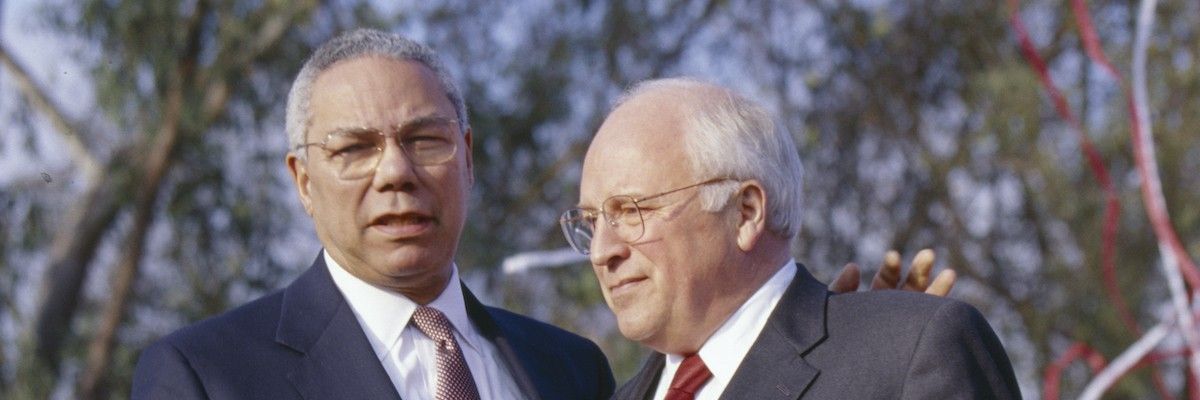In establishment circles, the passing of General Colin Powell, felled by Covid-19 at age 84, has unleashed a torrent of admiring tributes. In many respects, the former chairman of the Joint Chiefs of Staff and secretary of State deserves the accolades. With few exceptions, Powell towers over his successors in those offices. For evidence, just consider the blundering performances of General Mark Milley as current Joint Chiefs chair and of Antony Blinken, presently the nation’s chief diplomat.
Even so, Washington is a city where praise gets liberally dispensed and should not be taken too literally. Will Colin Powell be remembered as a “Great American?” For the next few weeks or so, the answer to that question is probably yes. After that, who knows? In political circles, memories tend to be short. And time has a way of tarnishing the luster of even the most illustrious figures, as the spirits of Thomas Jefferson and Woodrow Wilson could readily testify.
In the interim, we might consider these two questions: From our present perspective, what substantive legacy does Powell leave? And what does his life signify?
The place to begin is with this acknowledgment: As a military professional, Powell became the most prominent member of the Vietnam generation. As a promising younger officer, he had completed two tours of duty in Southeast Asia. Rising through the ranks, he absorbed and then played a large role in codifying the principal lessons that the officer corps itself took away from that melancholy conflict. By the early 1990s, those lessons became part of a de facto Powell Doctrine meant to guide decisions regarding the use of force by the United States.
On that score, the Powell Doctrine amounted to a military intervention into politics. Its barely disguised purpose was to constrain decision makers, preventing the successors to President Lyndon Johnson and defense secretary Robert McNamara from embarking upon needless and unwinnable wars.
The essence of that doctrine can be simply stated: Fight only when absolutely necessary and then go big, win quickly, and head home. Or to put it another way: avoid protracted, dirty, morally ambiguous wars that—as had Vietnam—undermine the integrity of the armed services and besmirch the standing of U.S. troops in the eyes of the American people.
The Gulf War of 1990-1991 seemingly validated the Powell Doctrine and vaulted Powell himself, now a four-star general, to the height of his influence. Credited with playing a key role in the ostensibly decisive victory of Operation Desert Storm, he was for a time the most popular and arguably the most powerful figure on the Washington scene.
Yet as events would show, he was already falling out of step with his times. The Powell Doctrine was cautionary. The prevailing mood in Washington after the Cold War and following Desert Storm had little patience with self-imposed constraints. By the time Powell retired from active duty in the autumn of 1993, senior officials and pundits eager to put American armed might to work were already chipping away at his eponymous doctrine. Military activism in places like Somalia, Haiti, and the Balkans, along with sparring in the Persian Gulf, was becoming the order of the day.
Upon leaving active duty, Powell came out of the closet politically, aligning himself with the moderate wing of the predominantly white Republican Party. During the 1990s, he was far and away the most prominent black American to identify with the GOP. From this perspective, his return to public life in 2001 as secretary of State to newly elected President George W. Bush was anything but a surprise. On the surface, the appointment made all kinds of sense. A novice when it came to world affairs, candidate Bush had vowed to pursue a “humble” approach to foreign policy. The sober and seasoned Powell seemed just the person to help Bush deliver on that promise.
Then came 9/11. In an instant, Bush chucked humility for militant globalism, targeting for destruction an “Axis of Evil” along with anyone to whom his administration could attach the label “terrorist.” In the inner circles of power, zealotry displaced humility. Soon thereafter, a radical Bush Doctrine of preventive war spelled the final demise of the Powell Doctrine.
It fell to Secretary Powell in early 2003 to make the case for the Bush Doctrine before the United Nations Security Council and the world at large. The issue immediately at hand was the planned U.S. invasion of Iraq, a country that the Bush administration falsely insisted was implicated in 9/11. Powell’s effort to sell a war intended to topple Saddam Hussein persuaded few and accomplished little apart from irreparably damaging his reputation for probity and good sense. His usefulness to President Bush likewise ended.
If only figuratively, Powell became the first casualty of Operation Iraqi Freedom. Thousands more were to follow, of course, as the Iraq War, in tandem with a simultaneous and even longer conflict in Afghanistan, demolished whatever lingering remnants of the Powell Doctrine remained. For a new generation of American soldiers, the post-9/11 “forever wars” became the functional equivalent of Vietnam, with one difference: Notwithstanding stresses stemming from multiple combat tours, the U.S. military did not succumb to the pathologies that had spread throughout the ranks in Vietnam.
The troops remained steadfast throughout. On the other hand, they did not win. And the American people, even while declaring their warm regard for “the troops,” chose not to notice. Meanwhile, those who had led the nation astray—our latter day versions of President Johnson and Secretary McNamara—escaped accountability.
In the twilight of his life, Colin Powell himself must surely have noticed. That the central undertaking of his professional life had ended in abject failure could hardly have escaped his attention. His own role in perpetrating a recurrence of a crime akin to Vietnam can only have been a source of unimaginable pain.
This article was republished with permission from The American Conservative
















